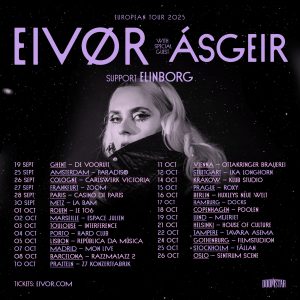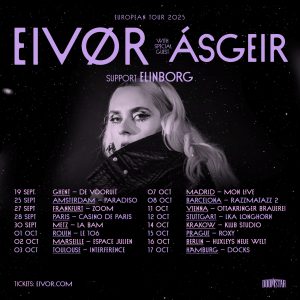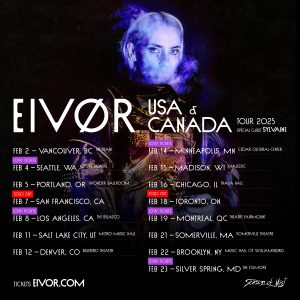Still, Eivør’s new album stands out amidst her two-decades long discography as a bold new venture. ENN ties back to the traditional folk music that she grew up with in the Faroe Islands, while also branching out into dark electronics and cosmic orchestration.
“ENN is the most nuanced and experimental album that I’ve created to date”, Eivør says. “There is an unyielding tide of destruction at the core of the album’s journey, but there’s also hope and comfort to be found in its blue embrace”.
ENN comes out tomorrow, Friday, June 14, on Season of Mist. But you can chat with Eivør while listening to all eight glowing tracks today at 2 pm Eastern Time by joining the listening party over on her YouTube channel.
Join the listening party for ENN: https://www.youtube.com/live/ZHk29yQTX_Q?si=fmHXZH_nC32THApz
Pre-order & Pre-save: https://orcd.co/eivorenn
Eivør Pálsdóttir grew up in a village of just 400 people, tucked away among the Faroe Islands. Her music has always been shaped by the extreme contrasts of this remote landscape, where impossibly bright summers suddenly fade under the cover of dark, heavy winters. She’s now recognized by fans across the world for her thunderous Nordic hand drum and ecstatic throat singing. But it was while on a retreat to the small mountain village of Tjørnuvík, with her partner, the classical composer Tróndur Bogason, that her new album began to head in an unexpected direction.
“Tróndur and I have written a lot of music together for my albums over the years, but never anything quite like this”, Eivør says about ENN‘s stunning opener. Despite being grounded by a stark but sturdy piano, “EIN KLÓTA / A PLANET” slowly sweeps you off your feet with her operatic falsetto. “It’s a song about change, about being carried further and further away from something that was once familiar and safe”.
Throughout her career, Eivør has covered lots of stylistic ground. As a young teenager, she played with various rock and jazz bands. By the time she turned 17, she had already released her first album of folk songs and nabbed two Icelandic Music Awards. But even she was surprised to discover that her forays into electronic beatmaking were the stems for her new album.
“Slowly, I realized this wasn’t a side project”, Eivør says. “Creatively, this is where I am right now”. Her new Prophet-5 synthesizer had hardly made it out of the box before she hammered out “HUGSI BERT UM TEG / STILL JUST YOU”, a celestial swoon of dream-pop that dances like the colors of the milky way. “Usually, I spend months or sometimes years writing a song, but this one came rushing out of me”.
As displayed by the video’s synthetic light show, lead single “JARÐARTRÁ/DUST TO DUST” is one of the most beat-oriented songs on ENN. But the steady electronic pulse stems from more natural springs. In English, the title translates as “Death Lust”, a primordial desire to return to the earth. While it sounds out of this world, the heaving bass line was actually born out of an old Faroese folk melody. “When I wrote this song, I envisioned the earth in its rawest elements: oceans, volcanoes, storms, soil”, says Eivør. “We all have echoes of these elements within us, but maybe we tend to forget that we are part of nature and its endless circle of decay and growth”.
ENN does mark a stylistic leap, but Eivør hasn’t forgotten where she comes from. “UPP ÚR ØSKUNI / RISE FROM THE ASHES” pays tribute to all the women who’ve supported her with what’s certainly the album’s most metal moment. “Sing to the darkness”, she growls from the pit of her throat, conjuring a devilishly anthemic guitar riff that’s bound to enchant the hordes at this year’s Hellfest.
“I imagined a coven of witches, past and present, chanting to each other across the chasms of time”, Eivør says about writing “UPP ÚR ØSKUNI / RISE FROM THE ASHES”. That mental image will forever be seared into our cultural memory by the song’s positively bewitching video, which was created by a wickedly talented team of women.
Most of ENN was written in partnership with the esteemed Faroese poet Marjun Syderbø Kjelnæs. “I greatly admire Marjun”, says Eivør. “When she sent me the poem that became the album’s title track, I got goosebumps all over”. As if her eerily echoing vocal melody wasn’t enough to send shivers down your spine, the story behind “ENN / STILL” is truly chilling. A woman wanders through her war-torn town, longing after her conscripted lover. But amidst the wreckage, her loving memories offer a glimmer of hope. After all, the song’s heavily throbbing heartbeat appeared, as if out of thin air, while Eivør was walking through the mountains near her home.
“It was one of those typical Faroese days when the light really imprints an otherworldly feeling to the landscape” she remembers. “You get this feeling of overwhelming beauty wrapped in gloominess and mystery”.
Though ENN opens by soaring off into uncharted territory, in the end, the album comes full circle. Eivør has been dwelling over its elegiac finale ever since Tróndur played it for her a few years ago. But the stuttering keyboard finally comes to rest on the soft and supple “GAIA”. The strings bend with the quiet force of gravity, as if lowering her back into the earth’s pull.
“I wanted ENN to close with a love hymn to the earth, our mother who brings us peace and solace in times of trouble”, Eivør says. “The album explores the links between humanity and nature; the primal urges of the heart, the undying desires of the human flesh and the endless struggle we choose to endure in order to achieve our goals. All of this goes on while our planet hurtles through space, setting the stage for our battlegrounds, but also our sanctuaries”.
On ENN, Eivor moves heaven and earth.
View Eivør



